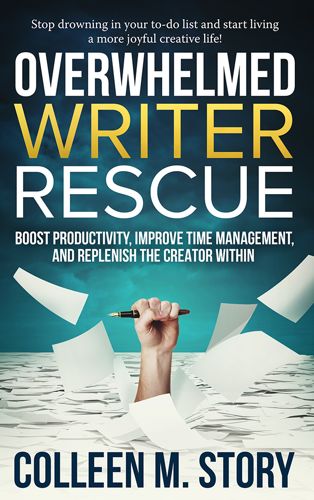Overwhelmed Writer Rescue by Colleen M. Story helps artists escape fear, frustration, and failure with time management suggestions designed to increase productivity. While arguably a timeworn topic, Story uses her background as a wellness writer for publications such as Healthline and Women’s Health to put a unique mental fitness spin on why artists experience overwhelm and self-sabotage.
 Her techniques on how to expand our writing time and sustain creativity are the perfect roadmap for professionals who feel bogged down by deadlines or beginners who need motivation to stay the course when the road gets rough. Basically, any writer looking to develop career longevity will benefit from reading Story’s insights, so let’s examine her book’s themes.
Her techniques on how to expand our writing time and sustain creativity are the perfect roadmap for professionals who feel bogged down by deadlines or beginners who need motivation to stay the course when the road gets rough. Basically, any writer looking to develop career longevity will benefit from reading Story’s insights, so let’s examine her book’s themes.
Why Do I Feel Overwhelmed?
Story recommends that we should start where we are right now rather than fantasizing over the perfect conditions needed to achieve a goal. The stress that comes from the if-only syndrome—if only I had more time to write, if only I had a larger readership—often immobilizes us and keeps us from embracing habits that turn dreams into reality. However, if we take immediate action toward our goals, our expectations will grow to match our progress rather than wither under the stress of unattainable perfection. Since we can’t change our circumstances, concentrating on what we can control will eliminate overwhelm.
Begin by creating a schedule to stay focused and to reduce the brain fatigue that comes from overwhelm and indecision. Story advises we structure our schedules around long-term goals rather than short-term desires. For example, if the goal is agent representation, design a list of tasks that build toward the dream—pen fabulous novel, edit novel, compose synopsis, research agents, write a query letter, contact agents. Don’t deviate from that road just because something else (like building a website) seems fun or easy. Educate yourself about which parts of the journey are essential and which can wait until after you’ve reached your larger goal.
On the other hand, Story warns that we should not use a schedule as an excuse to overload ourselves. Writing is a creative endeavor, and we must clear time to nurture the muse. Story recommends limiting to-do lists to three goal-oriented tasks per week. Do not attempt to juggle more. Dice these large goals into small chunks to ensure manageability, and tackle the list when your mind is most alert like in the mornings before the demands of the day take over.
Why Do I Self-Sabotage?
While the conscious mind desires a productive writing life, the unconscious beliefs we hold about ourselves may undermine our work even if we’re not fully aware of those destructive forces. The best way to regain control is to identify what Story calls the “Seven Productivity Saboteurs:”
- Writer’s Guilt: the feeling that your time is better served elsewhere
- Dis-ease: the mental or physical issues that arise to keep you from writing, whether it’s a lack of focus, sleepiness, or disorganization
- Self-Doubt: the emotional uncertainty that keeps you from writing or attempting something new
- Perfectionism: the desire to be right (rather than to write) paralyzes the creative mind
- Workaholism: the habit of putting work before writing
- Goal Setting: the practice of creating goals and deadlines that are unrealistic, cumbersome, or discouraging
- Belief: the idea that success comes solely from positive thinking
Although all or some of these saboteurs may feel painfully familiar, Story assures us there are actions we can take to overcome each of them. The first step is to realize that self-sabotage is often triggered when we invoke change or when we encounter setbacks such as criticism. Our emotional response to these triggers may manifest as one of the seven productivity saboteurs. Rather than succumb to the saboteurs, reflect on your achievements and remember that you’ve come too far to give up on your goals. Look for a way to break the cycle. For example, if you suffer from self-doubt, find a partner to motivate you. Do online writing sprints with a friend and ask them to help brainstorm when a story concept or career goal hits a roadblock.
How Do I Become More Productive?
Story recommends starting small. Pledge to work on your goal for just five minutes a day and build from there. More often than not, your love for writing or the intensity of the task will take over, and you’ll find yourself engrossed enough to spend more time than originally planned. If this doesn’t work, find ways to enhance your to-do list by adding an element of fun. Take your computer outside and work by the pool. Play inspirational music or start with a task that excites you like writing a love scene. Better yet, promise yourself a treat such as a trip to the cinema if you finish a full chapter. Train the brain to see work as fun, and you’ll find it easier to finish each endeavor.
How Do I Achieve Longevity and Avoid Burnout?
Sustaining one’s creative fire is no easy task. Story believes that you must first articulate why you write before you can expect to write with consistency and passion. No matter how productive you become or how well you overcome saboteurs like self-doubt, if you’re not motivated, you’ll never succeed. Explore why you want to be a writer. What does success mean to you? Do you write to help or influence people? Do you write to establish a connection or share an idea? Do you write to challenge yourself or test your creativity? What are you willing to do to reach the level of success you desire? Story encourages us to answer these questions and define what drives our goals. Once we’ve established our motivations, obstacles and setbacks will seem less daunting because our impulse to succeed will have purpose.
The idea that artists need a strong internal drive to achieve longevity is what drew me to this book. As a writer transitioning from student to professional, these suggestions form the perfect roadmap for the emotional journey that lies ahead. Without the structure of academic deadlines and an instructor to keep me focused, I’m more susceptible than ever to the pitfalls of overwhelm and self-doubt as I market my novel and pursue freelance opportunities like this one. Thanks to Colleen M. Story I now have several time management and productivity tools to stay focused.
